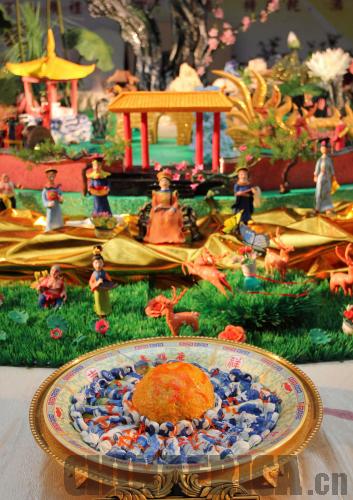| 
Since ancient times China has enjoyed a rich food culture, with many dishes becoming famous and part of the nation's intangible cultural heritage. The longing for those lip-smacking delicacies was stoked anew recently, both at home and abroad, by A Bite of China, a popular Chinese teleseries on China's varied food culture.
But despite the fervor they produce, none of these famed dishes have made it to the UNESCO's Intangible Cultural Heritage list. Yet.
There are other cuisines that have won coveted recognition. French gastronomy, where the multi-course meal gets added flavor from time-honored rites and presentation, was one of the first contenders to make it to the list in 2010. Other peers on the culinary roll of honor are traditional Mexican cuisine, the Mediterranean diet of Cyprus, and South Korea's kimchi, seasoned vegetable dishes, together with kimjang, the way to prepare the dish. The honor has also been shared by washoku, traditional Japanese cuisine, and cuisines from Croatia and Turkey.
In March, Chinese food experts launched a new attempt to join the list. They will know if the bid has been successful before the end of the year.
Food for thought
The first attempt to gain this global recognition for Chinese cuisine was made in 2011 but it was unsuccessful. Feng Enyuan, Secretary General of the China Cuisine Association (CCA), explained the problem. It is very hard to select a single dish to represent China's entire food culture. "China's long history, vast territory and extensive contact with other nations and cultures have given birth to a distinctive culinary art," Feng said.
Chinese cuisine encompasses styles originating from the nation's diverse regions as well as Chinese living in other parts of the world. The history of the cuisine stretches back thousands of years. It has changed from period to period and from region to region, influenced by climate, imperial fashions and local preferences. The eight culinary traditions of China by region are the Anhui, Cantonese, Fujian, Hunan, Jiangsu, Shandong, Sichuan and Zhejiang cuisines.
Why has China's food culture not been included in the cultural heritage list? "When kimchi was added to the list there were a lot of discussions," said Bian Jiang, CCA Deputy Director. "It was stated that it was not just kimchi, the food, that was added, but also the customs and memorabilia associated with it. That is the [learning] we have acquired from the successful bids."
UNESCO experts say South Korea's kimjang made it to the list for its impact on people and society, like improved relations within the community when people share kimchi, the solidarity and joy it brings, the different ways of making it and the way it's eaten.
So based on the success of the neighboring country, Bian says this time, the CCA has shifted its emphasis from food to the more intangible elements associated with it, such as cooking skills, cuisine styles, methods of eating, the stories behind the food, and the culture it promotes.
The France food culture was described by the UNESCO as "a social custom to celebrate the most important moments in the life of an individual or a group, such as weddings, birthdays, and so on."
Cheng Xiaomin, CCA Deputy Secretary General, said the cuisines that have found place in the UNESCO list emphasize more of a cultural identity. Food embodies people's lives - a compound of simple family life, customs and rituals.
The ongoing attempt to put Chinese food on the world culture list is focusing on three categories. It is drawing attention to traditional cooking techniques, such as the "orchid knife" skills - essential kitchen knife skills, one of the most important parts of the Chinese culinary arts. The second is the customs behind food. For example, the reason Chinese people use a round table for dinner, or the reason they eat dumplings at Spring Festival. The third is the success stories about protecting Chinese food heritage, such as the art of making mature vinegar from sorghum in Shanxi, a trademark of the province.
Bian said the bid to put Chinese cuisine on the list draws heart from the fact that it already includes acupuncture and moxibustion, two elements of traditional Chinese medicine. Therefore, this time the bid started with the stories and social customs behind the food and the culture it promotes.
Taste of success
In this era of globalization, food culture shows the power of cultural communication. "Whether we are successful or not, it is a good opportunity to promote and popularize Chinese food culture abroad," Bian said.
To promote Chinese food globally, the names of 800 famous Chinese dishes, including staple food, have been translated into a standard English format by the CCA.
Dong Keping, a food consultant for A Bite of China, said the attempt to join the Intangible Cultural Heritage List is a big step forward in promoting Chinese cuisine on the world stage. Chinatowns abroad are still dishing out the cheapest Chinese dishes, which do not fully reflect China's rich food culture. Once Chinese cuisine is included in the UNESCO's list, the Chinese food industry abroad will have better opportunities to develop.
Chinese dining is part of Chinese culture, said Zhao Hui, who runs Chinese restaurants in New Zealand, according to an online report by China Radio International. If Chinese cuisine makes it to the list, it will be easier for Chinese food to jell with the local community abroad, he added. Also, it would increase mainstream society's awareness of Chinese food.
"It is not only an opportunity to show the world Chinese culture, but also promote traditional Chinese food," Bian said. "It would then lead to traditional cooking techniques being preserved and propagated. This is the main objective for trying to get Chinese cuisine on the UNESCO list." |